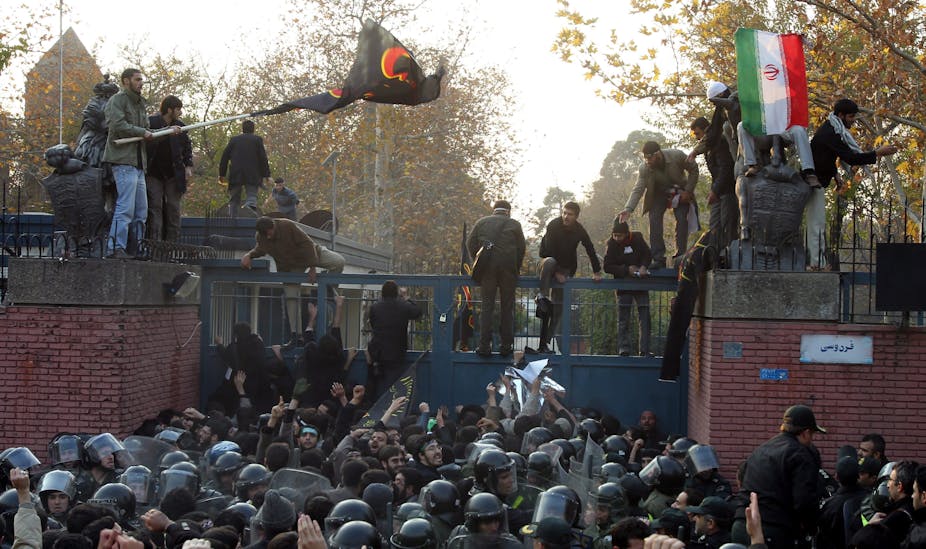Iran’s relations with the West have been difficult for years.
The growing international condemnation of Iran for its less-than-transparent nuclear program, based on a report by the International Atomic Energy Agency has led to more sanctions on Iran.
This provided the pretext for the storming of the UK diplomatic compound in Tehran, reminiscent of the hostage taking of the US diplomatic personnel in 1979, lasting for 444 days.
We might not remember, Iranians do
Iran’s relations with the West have been deteriorating with no end in sight. Commentary on this troubled relationship has generally focused on the experience of the 1979 revolution which brought the Islamic regime to power. But the pre-1979 history of Iran’s relations with the West was not trouble-free. Iran was never colonized by European powers, but this did not protect it from the colonial reach of the United Kingdom.
In the late nineteenth century, the British-India Company had established a monopoly over tobacco trade in Iran, at the expense of the local merchant class.
At the beginning of the twentieth century the UK established exclusive rights to prospect for oil in Iran, resulting in the formation of the Anglo-Persian Oil Company in 1908. Dissatisfaction with these exclusive rights, and the inability of the Persian dynasties to withstand colonial pressure was a major source of public anger and strikes.
The 1906 constitutional revolution was inspired by the desire to curb the absolute power of the king and reduce foreign influence in Iran. Tellingly, the revolution started in the public garden opposite the British Embassy in Tehran.
Oil, coups and Iranian anger
The Iranian parliament remained a rubber-stamp institution until 1951, when it voted to nationalize Iranian oil and boot-out the Anglo-Persian Oil Company. This was a major success in asserting Iran’s national interests, but the charismatic Prime Minister Mohammad Mossadegh paid a heavy price for his leadership.
In a well-orchestrated move, the American CIA and the British government colluded with the Iranian King to remove Mossadegh from office in 1953. Following the coup, Mossadegh was humiliated in a sham trial and spent the rest of his life under house arrest.

The leitmotif of Iran’s relations with the West until 1979 was weak dynasties succumbing to colonial pressures. This was how the Pahlavi dynasty was seen by the public as it consolidated its relationship with the United States in the post-WWII era. The anti-American aspect of the 1979 revolution was a manifestation of a widely held belief that Washington was the mainstay of the dynasty.
The role and evolution of anti Western attitudes
Anti-Americanism has been a hallmark of the revolution but it has also gone through changes in the last three decades. President Muhammad Khatami tried to move Iran away from its self-imposed isolation and repair relations with the United States by appealing to universal values to serve as the basis of a “civilizational dialogue”.
A survey conducted in Iran during his presidency (1997-2005), revealed a large proportion of Iranian youth favouring normalization of relations with the West. Following the September 11 attacks, large crowds in Tehran were moved into a spontaneous display of solidarity with the victims in New York. This was far removed from the scenes of the 1979 hostage taking crisis.
The anti-Western sentiment in Iran, however, serves an important purpose for the conservative leadership. Memories of foreign involvement in Iran provide justification for the policies of the incumbent leadership, which has demonstrated no hesitation in cultivating feelings of antipathy and fear towards the West.
The storming of the British diplomatic compound was a deliberate slap in the face of the United Kingdom, raising tensions and justifying the regime in the eyes of its supporters.

